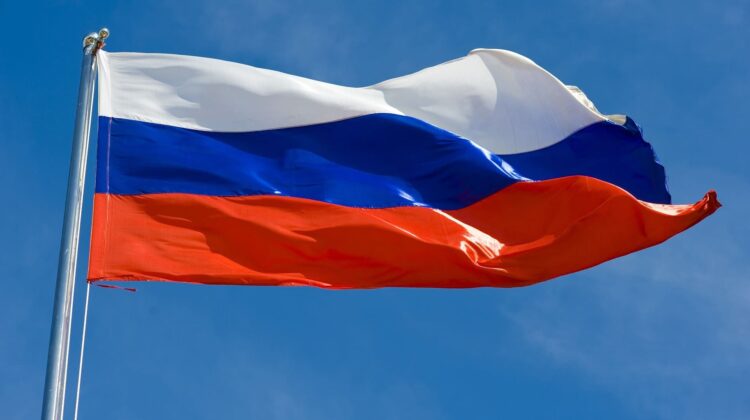
The Russian Federation of the New Millennium
Domestic and Global Geopolitics
The Russian Federation of the New Millennium is profoundly different from all previous “Russias”, but from each has drawn something to get to be what it is today.
A Russia that is certainly daughter of her past.
A past dense and rich of history, between Empire, Dictatorship of the Proletariat and “El’cinian” Liberalism (just to mention three of the most significant passages).
A past from which Putin has tried, and still tries, to take everything necessary to bring his country back to the power of the “years that were”. A geopolitical power in primis, but never forgetting also the “internal aspect”.
Domestic issues, in fact, to be significantly improved right from the socioeconomic situation.
In this regard, some data on “internal” Russia:
- Gross Domestic Product which is around 1600 billion dollars. For a country of this size and with ambitions of Great Power is a figure to raise considerably, at least returning to the levels “pre-Euromaidan”.
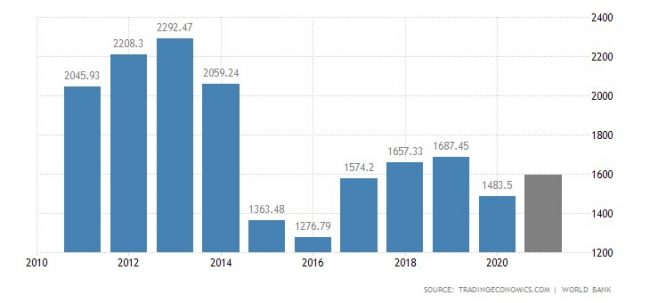
This is even more apparent when comparing the figure with these other nations:
- United States of America: above 20000 billion dollars. This means more than ten times that of Russia.
- People’s Republic of China: about 16000 billion dollars.
- EURO area: about 14000 billion dollars.
- Federal Republic of Germany: about 4000 billion dollars.
- About 60 percent of total exports still consist of fuels, minerals, and metals. A “quantum leap” in exported products, through greater diversification and the creation in various fields of products with higher added value, is essential for the growth and strengthening of the country. In this regard, the considerations included in the “State of Commodity Dependence 2021” report promoted by the United Nations Conference on Trade and Development (UNCTAD) leave no room for doubt: Unctad considers a country dependent on commodity exports when more than 60% of its total exports are composed of raw materials and agricultural products. More than a condition, it is a real “trap”, blocking the growth of many economies. […] Dependence makes countries more vulnerable to economic shocks with inevitable negative impacts on fiscal revenues, debt, and economic development. […] Unctad (urges) […] to improve their technological capabilities to escape the “trap“.
- The “GINI Index” shows that Russia is still a strongly unequal country, even if compared to the last ten years of the 20th century (a period of wild privatization and substantial dismantling of the welfare state) the situation has certainly improved. More specifically, the “Statist Research Department” writes this: “Russia’s Gini index score was measured at 37.5 in 2018. In the past two years, the indicator increased, showing higher inequality. Over the observed period, the highest Gini index in Russia was recorded at 41.3 in 2005 (in 1996 reached the peak of 46). A lower Gini index score indicates more equality in an economy, while a higher score implies more inequality” [1]. Obviously, with the pandemic, the situation has not improved appreciably.
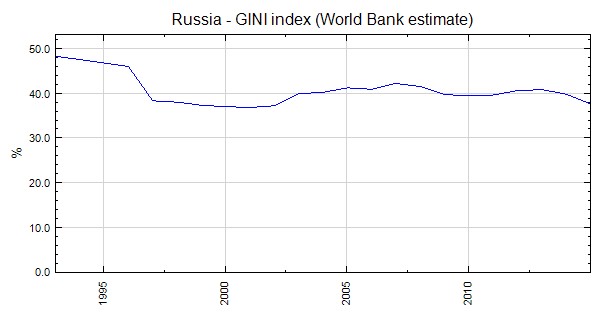
In this regard, the following words from proposals by various experts on the subject should be given greater consideration: “Fiscal policy is a vital instrument for lessening inequality. The fiscal approach plays a role in guaranteeing macro-financial security and limits the challenges that lopsidedly hurt the burdened populace. Policy redistribution with other macroeconomic goals can improve the income value of the working class and in this manner bolster economic development. Fiscal formulations play a role in mitigating income inequality; however, the redistributive function of policy strategies could be strengthened by dependence on riches and property tax, increasing income tax assessment, reducing sharp practices of tax avoidance, improving social benefits while limiting productivity costs” [3].
As for the “geopolitical question,” however, the directions in which the Kremlin is moving are as follows:
- Main objective: creation of a multi-polar world, in clear opposition to the US-led unipolar world that arose after the dissolution of the Soviet Union. Objective shared with various actors both regional and global, with the People’s Republic of China being one of the nations most interested in the subject.
- Maximum commitment towards the “Near East”, as demonstrated also in these days by the particular attention towards Ukraine. The “ball” of the Russian ruling class is, in fact, to keep NATO as far away as possible from its borders and the tensions of the last period Washington – Moscow – Kiev respond precisely to this felt need of the Kremlin. The enlargement of NATO to various ex-USSR countries during the 90s of the 20th centuries and the early 2000s, in fact, has been interpreted in Russia as a betrayal of the more than likely “vocal pact” between Gorbachev and various US representatives at that time. An eventuality that in the Moscow control rooms they do not want to see repeated.
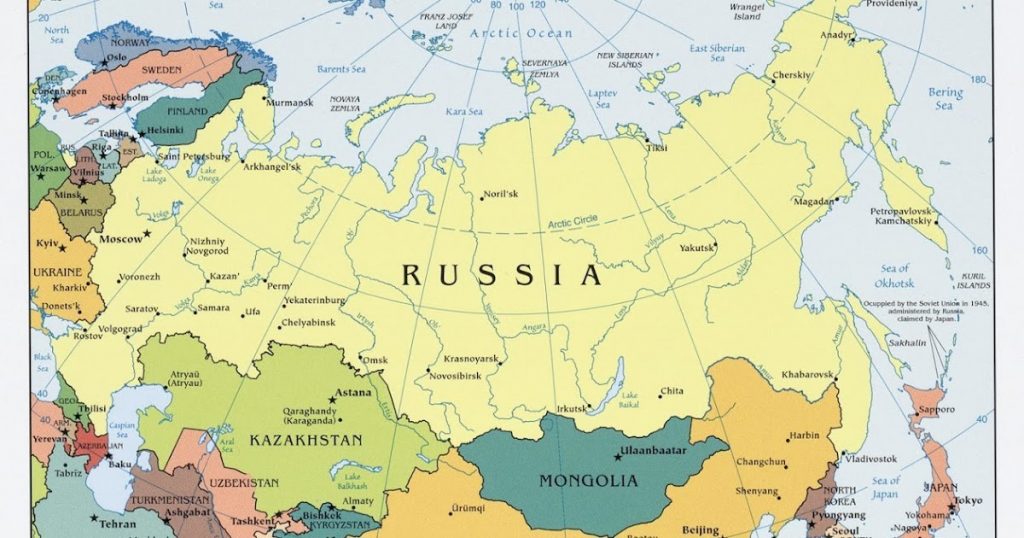
- Rediscovered interest in the “Far Foreigner”, essentially abandoned by El’cin. More in detail, I emphasize the following cases:
In the Latin American and Caribbean context, Cuba and Venezuela benefit greatly from their special relationship with Russia. One example is the cancellation of 90% of Havana’s debt with Moscow in 2013 (about $35 billion), dating back to the Soviet period. As well as the flight of Russian Tu-160 strategic bombers to Venezuela in 2018, with a triple significance: to show the world Russia’s military capabilities, to signal that Moscow has returned to play a global role, and to shore up the shaky Maduro government (hated by the White House) in Washington’s “backyard.”
Ties based on mutual interests and, above all, in function of “anti – unipolarity”, with China. The strategic partnership Moscow – Beijing has reached levels never touched before and the words of the Chinese Foreign Ministry spokesman Zhao Lijian a few days ago leave no room for doubt about the near future: “There is no limit, no precluded area and no ceiling to the cooperation between China and Russia”.
Renewed commitment in Africa, for example, with interventionism in Libya, also “using” the increasingly famous Wagner contractors in support of General Khalifa Haftar of Cyrenaica. But going beyond this, it is also possible to highlight the major commitment to supplying arms to Algeria (approx. 4 billion dollars), Egypt (over 2 billion), Angola (approx. 250 million) and Nigeria (approx. 200 million), as well as Russian access to air bases in Madagascar, Egypt and Guinea. A 360° strategy to be a protagonist in a continent with immense potential.
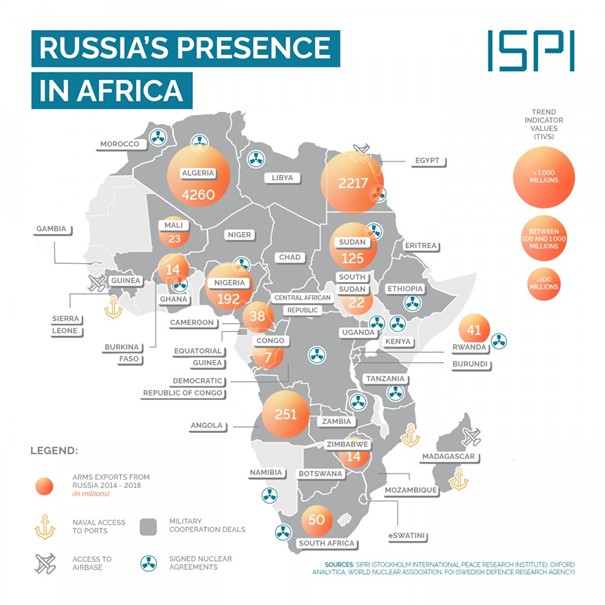
- Difficult relationship, as mentioned before, with NATO, USA, and European Union. There is an extreme competition in many fields and two visions of the world substantially different. However, a coexistence based on mutual respect and cooperation is necessary, otherwise there will be perpetual instability which damages first the peoples of the earth.
Talking about instability, the issue of the “Nord Stream 2” pipeline is emblematic, explained as follows by Aldo Ferrari, one of the greatest Italian experts in the field: “For Moscow, the threat of a stop to the Nord Stream 2 pipeline is the last act of an increasingly open clash with a West that, for its part, does not consider Russia’s security needs. The events of these days are part of and confirm the trend of a general worsening of relations observed in recent years. A progressive and irreversible drift […]”.
- Renewed commitment to the Arctic, with melting ice facilitating year-round trade routes that were unthinkable just a few years ago. It is no coincidence that President Putin, in March 2018, spoke these words: The Northern Sea Route is key to the development of the Russian Arctic and Far East.” [6]
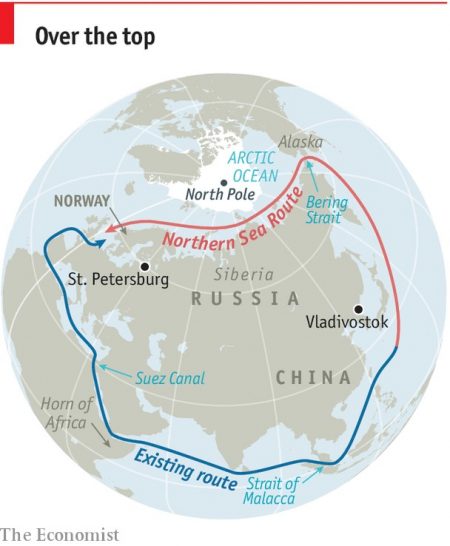
- Space engagement returned to Soviet levels, as an increasingly decisive civil and military “battlefield”. A competition between great powers, with the increasingly pervasive intrusion of private wealthy, which already concerns the “global strategic balance” and the ability to develop peacefully (or not) in future years.
In conclusion, therefore, it is possible to say that the Russian Federation of the New Millennium is a country that is painstakingly searching for a power lost with the dissolution of the Soviet Union.
A power that passes forcibly from the reconquest of a geopolitical role of the highest level, able to guarantee an adequate degree of development and welfare even in a hyper-competitive world like the present one.
Author: Alessandro Fanetti – Italian geopolitics and geoeconomics analyst; writer
[1] https://www.statista.com/statistics/872875/gini-index-score-of-russia/
[2] https://www.indexmundi.com/facts/russia/indicator/SI.POV.GINI
[3] https://studycorgi.com/inequality-in-russia-causes-and-consequences/
[4] https://cografiharitalar.blogspot.com/2013/02/asya-kitasi-siyasi-haritasi.html
[5] https://www.ispionline.it/it/pubblicazione/russia-africa-whats-new-24400
[6] https://www.economist.com/the-economist-explains/2018/09/24/what-is-the-northern-sea-route
